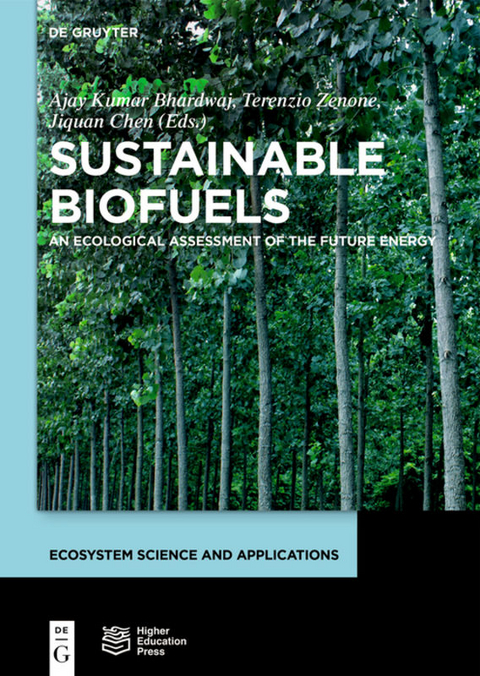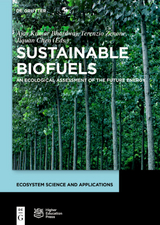Sustainable Biofuels
An Ecological Assessment of the Future Energy
Seiten
2015
De Gruyter (Verlag)
978-3-11-027584-1 (ISBN)
De Gruyter (Verlag)
978-3-11-027584-1 (ISBN)
Ecosystem Science is a highly interdisciplinary field of global significance. This series – copublished by Higher Education Press (HEP) and De Gruyter Publishers – is devoted to prominent topics in the fundamentals of ecosystem science and its application. The series is targeted to an international audience of scientists and practitioners, while maintaining a strong emphasis on reaching scholars and the general public in China. This will be accomplished by publishing all ESA books in both English and Chinese.
With oil resources approaching their limits, biofuels have become increasingly attractive. This book provides a detailed description of the ecological implications of second and third generation biofuel feedstock production systems, beginning with an introduction to the importance of ecological sustainability alongside economic viability. The book is divided into sections describing theoretical foundation and benefits of various biofuel cropping systems, and providing a description of practical ecological limitations to achieve those fundamental benefits. The book covers such critical issues as greenhouse gas emissions, carbon balance, water cycle components, other biogeochemical and socioeconomic interactions alongside life cycle analysis principals for achieving sustainability. These are some of the most important sustainability, environmental and economic issues which biofuel industry and scientific community is seeking answers to.
With oil resources approaching their limits, biofuels have become increasingly attractive. This book provides a detailed description of the ecological implications of second and third generation biofuel feedstock production systems, beginning with an introduction to the importance of ecological sustainability alongside economic viability. The book is divided into sections describing theoretical foundation and benefits of various biofuel cropping systems, and providing a description of practical ecological limitations to achieve those fundamental benefits. The book covers such critical issues as greenhouse gas emissions, carbon balance, water cycle components, other biogeochemical and socioeconomic interactions alongside life cycle analysis principals for achieving sustainability. These are some of the most important sustainability, environmental and economic issues which biofuel industry and scientific community is seeking answers to.
Ajay Kumar Bhardwaj, Michigan State University, MI, USA; Terenzio Zenone and Jiquan Chen, University of Toledo, OH, USA.
| Erscheint lt. Verlag | 24.4.2015 |
|---|---|
| Reihe/Serie | Ecosystem Science and Applications |
| Co-Autor | Higher Education Press |
| Zusatzinfo | 50 b/w ill. |
| Verlagsort | Berlin/Boston |
| Sprache | englisch |
| Maße | 170 x 240 mm |
| Gewicht | 760 g |
| Themenwelt | Naturwissenschaften ► Biologie ► Ökologie / Naturschutz |
| Naturwissenschaften ► Chemie ► Technische Chemie | |
| Technik ► Umwelttechnik / Biotechnologie | |
| Schlagworte | Bioenergie • bioenergy • Bioenergy; Biofuels; Ecology; Ecosystems Science; Sustainability • Biofuels • Ecology • Ecosystems Science • Nachwachsende Rohstoffe • sustainability |
| ISBN-10 | 3-11-027584-8 / 3110275848 |
| ISBN-13 | 978-3-11-027584-1 / 9783110275841 |
| Zustand | Neuware |
| Informationen gemäß Produktsicherheitsverordnung (GPSR) | |
| Haben Sie eine Frage zum Produkt? |
Mehr entdecken
aus dem Bereich
aus dem Bereich
Grundlagen, Systeme, Anwendung, Wirtschaft
Buch | Hardcover (2024)
Carl Hanser (Verlag)
99,99 €




